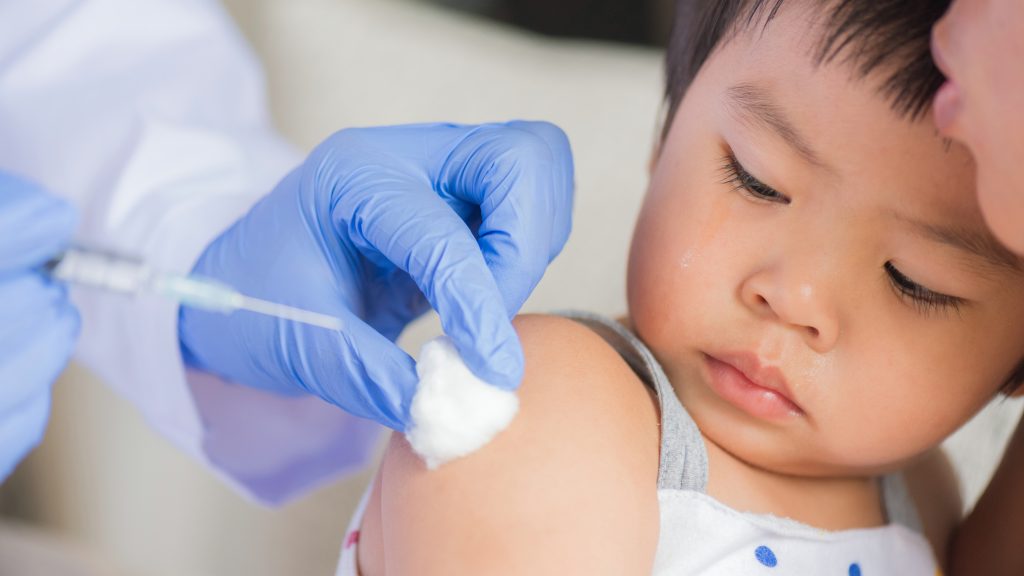-
Featured News
Infectious Diseases A–Z: Breaking down the MMR vaccine

The measles, mumps and rubella vaccine (MMR) is recommended in the U.S. for all children at 12 to 15 months of age. A second dose is recommended at 4 to 6 years, before a child begins kindergarten or first grade. Dr. Robert Jacobson, a Mayo Clinic pediatrician, explains how the MMR vaccine works and what diseases it protects against.
Watch: Dr. Robert Jacobson explains the MMR vaccine.
Journalists: Broadcast-quality sound bites with Dr. Robert Jacobson are in the downloads at the end of the post. Please "Courtesy: Mayo Clinic News Network."
What is the MMR vaccine?
"The vaccine is a combination of three vaccines; the 'M', for the measles vaccine, the second 'M' for the mumps vaccine, and the 'R' for the rubella vaccine. These are all live, attenuated or weakened viruses that mimic the diseases we are trying to prevent. "
How do the weakened viruses work?
"Given in the subcutaneous tissue, the viruses give a weak form of an infection that quickly is extinguished. The body develops immunity, antibodies and other defenses against the three diseases: measles, mumps and rubella."
Does the vaccine offer lifetime protection?
"The measles and rubella parts of these vaccines basically with one or two doses gives you immunity for life. There are some people who fail to respond and they need the protection of others — so-called herd immunity. Mumps is a little trickier. That immunity is not as strong as the immunity one gets from the measles or rubella portion of the MMR vaccine and may only work 78% to 80% after a dose of the mumps vaccine. It does appear to wane."
'M' is for measles.
"Measles is perhaps our most contagious viral disease. It's a significant illness in that it causes a fever and rash. It can cause complications such as pneumonia, ear infection and encephalitis. It can leave you with a chronic inflammation of your brain called 'subacute sclerosing panencephalitis,' and it can kill."
"Measles is a respiratory illness. There's a cough. There's a runniness of the nose and a runniness of the eyes associated with the fever. The rash and the respiratory droplets are very contagious. They can hang in the air and land on surfaces, leaving a room infectious with measles for up to two hours after the person who was coughing and breathing in that room has left."
'M' is for mumps.
"Mumps, unlike measles, is not a rash illness so much as it's a feverish illness associated with the swelling of the salivary glands, the parotid glands around the cheeks and it can inflame other glands. For males, it's the testes; for females, it's the ovaries. It can cause, in a small number of people who get mumps, an inflammation of the pancreas. It, too, can inflame the brain and cause a form of meningitis."
"Mumps is contagious through saliva. We'll hear about people on hockey teams, where they're spitting and sharing water bottles, spread mumps across the hockey team or across the locker room. Similarly, on college campuses where people are sharing cigarettes, and drinking glasses and water bottles, we'll also see mumps spread quickly. "
'R' is for rubella.
"Rubella is a very mild form of fever and rash. It is so mild that most people who get German measles don't know that they had it. The other name for rubella is German measles. It is a very mild condition, but it's horrible to a nonimmune pregnant woman and her child. It used to cause outbreaks in the U.S. every six to nine years. In the outbreaks in 1964 and 1969, we had perhaps over 20,000 pregnancies that were complicated by children having significant birth defects due to German measles. Another 12,000 resulted in fetal loss or therapeutic abortions from the deformations and changes done in pregnancy. It's a horrific illness for the pregnant woman and her offspring."
"Also, the 'R' in the MMR vaccine is an anti-autism vaccine. We now know the congenital rubella syndrome, which is caused when a pregnant woman not immune to rubella gets rubella and her child develops birth defects or congenital anomalies as a result of that rubella infection, 15% or 1 out of 7 of those babies also developed autism. By vaccinating against rubella with the MMR vaccine, we're preventing rubella, preventing congenital rubella and preventing autism."
Who needs the MMR vaccine?
"We all need these vaccines. Everybody needs protection against measles mumps and rubella. Everyone needs to avoid getting measles and mumps, both so they don't get sick with it and so they don't spread it. All of us, even those of us who are male or not planning to get pregnant, need protection against rubella or German measles so we don't infect a pregnant person who either didn't get the vaccine or didn’t respond to a vaccine. None of these vaccines work 100% of the time and, so, it's up to all of us to get vaccinated so that we create barriers between the infected person and the person who will be devastated by this illness."







